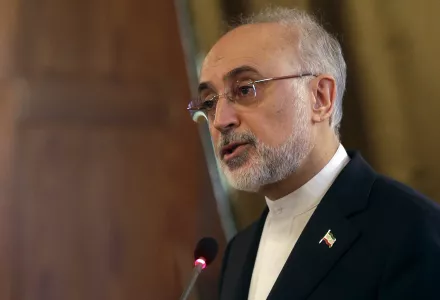
Note
A Hebrew-language version of the op-ed appeared in Haaretz on October 8, 2017. The translation was provided by the author.
Israel and the international community, under U.S. leadership, have gone to great lengths in recent decades in the attempt to prevent Iran from crossing the nuclear threshold, so far successfully. To date, however, Israeli national security discourse has accorded only little attention to the danger of this happening, nevertheless, despite our best efforts. Making matters worse, there is an even more severe scenario, a true nightmare, in which additional regional states, such as Saudi Arabia, Egypt, and Turkey, also decide to go nuclear, in response to Iran’s crossing of the threshold.
Let's assume, for arguments sake, that all preventative efforts have failed and Iran is about to cross the nuclear threshold. In this case, Israel would face the following primary options.
One option is a military attack against the nuclear sites, which would only be feasible as long as Iran had not yet actually crossed the threshold: once it does so, it will gain immunity from attack, much as in the case of North Korea today. The danger to Israel of a nuclear Iran is so severe, however, even if probably not existential, that Israel will have no other choice but to attack, once Iran approaches the threshold. Conversely, military action cannot solve the problem, only postpone it for a few years, at most, and at the price of severe damage to Israel's civilian rear, caused by Iran and Hezbollah. The additional time gained by military action could then be utilized to apply a variety of measures against Iran once again, including heavy sanctions, but the moment of reckoning, when it threatens to cross the threshold, may return.
Should additional states go nuclear, Israel will probably no longer be able to implement the "Begin Doctrine" and take military action, as it did against the Iraqi reactor in 1981 and, according to foreign sources, the Syrian reactor in 2007. Israel is at peace with Egypt and Turkey and both, much like Saudi Arabia, are U.S. allies and enjoy American security assurances. Turkey, moreover, is a member of the NATO alliance. A military strike against nuclear sites in these countries would be almost unthinkable.
A second option would be to end the policy of ambiguity regarding Israel's purported nuclear capabilities and adopt an explicit nuclear posture, designed to further strengthen Israeli deterrence. Assuming, however, that Iran is a rational actor, Israeli deterrence should be effective even under the existing policy of ambiguity. Whether international assessments of Israel's nuclear capabilities are accurate or not, Iran and other nuclear states in the future will have to assume this to be the case and exercise appropriate prudence. The incremental addition to Israel's deterrence, which might arguably stem from an end to ambiguity, does not appear to warrant the damage to its relations with the United States, international community and neighbors.
A third option would be to seek an American security guarantee, possibly in the form of a defense treaty, although there are also less binding possibilities. As long as we are talking solely about Iran, Israel's own deterrence should suffice. Moreover, even in the absence of a formal defense treaty, the Iranians have to assume that there is a de-facto U.S. commitment to Israel's security and that it thus enjoys extended American deterrence.
In a multipolar nuclear Middle East, however, the calculus would be different. In a situation in which some of the regional actors do not have diplomatic relations, or even channels of communication, and some deny the right of others to exist, the dangers of a conflagration are so extreme that a stable nuclear balance may not prove feasible. Even an American security guarantee would not be sufficient to prevent a deterioration in these conditions, but it might certainly be a moderating and stabilizing factor from Israel's perspective, especially if broadened to additional states and to a broader regional security regime.
There is a further option in this multipolar nuclear scenario, one which admittedly appears to be totally fanciful at this time, in the form of a regional arms control agreement, ultimately leading to disarmament. The primary danger in this option, for Israel, is that its adversaries, including Iran, Iraq, Syria, and Libya, have repeatedly violated binding international arms control agreements they had signed, and that it cannot trust them to behave differently in the future, at least until they become stable democracies, an unlikely eventuality in the coming decades. In a multipolar nuclear Middle East, however, a situation which will only materialize, if at all, a few decades hence, the other options may not be better and the impossible may become realistic.
A nuclear Iran will present Israel with severe dilemmas, but they are still a ways off, and decisions are not yet necessary, at least in regard to all of them. Nevertheless, processes and decisions in the nuclear realm take many years to play out, and Israel should already be conducting its thinking and planning today, quietly and without undue pressure, rather than leaving it for the last minute. It will take years to reach agreement with the United States on a defense treaty, if at all, to devise a means of ending nuclear ambiguity that does not entail severe costs, or to formulate arms control arrangements that serve Israel's interests.
At the present time, efforts should be focused on ensuring the future of the nuclear deal with Iran, which remains the best way to prevent it from going nuclear. The next stage would be to try and redress the agreement's flaws, first and foremost, its expected expiration at the end of its 10–15 year lifetime. The United States and its allies are already trying to reach agreement on a follow-on agreement with Iran, designed to ensure that it cannot go nuclear even after the current deal expires. A follow-on agreement such as this would be greatly preferable to the abortive efforts to reopen or terminate the existing one.
Statements and views expressed in this commentary are solely those of the author and do not imply endorsement by Harvard University, the Harvard Kennedy School, or the Belfer Center for Science and International Affairs.
Freilich, Chuck."Nuclear Dilemmas." Belfer Center for Science and International Affairs, Harvard Kennedy School, October 10, 2017.


